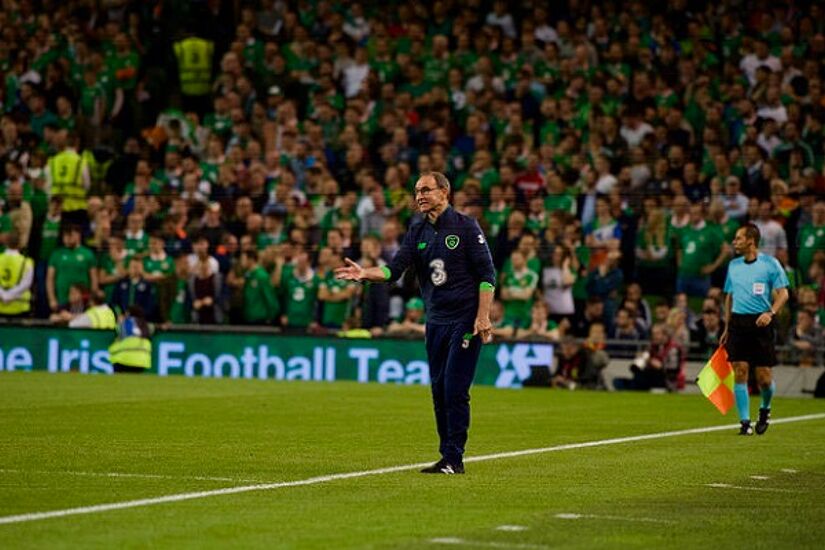Dublin set to host Euro 2020 Qualifying Draw

Credit: Brian F Smyth (ETPhotos)
Media representatives from all over the world will converge on Dublin’s Convention Centre in December next year to attend the draw for the for the 2020 European Championships.
Ireland was the successful bidder following an invitation issued to the host cities of this unique European Championship.
Matches in the 2020 European championships will be played in 13 different cities across the continent. Dublin’s Aviva Stadium will host four games, which is expected to bring an economic benefit of between €40-€50million to the capital.
The draw will take place on December 2, 2018 and will be televised live to 70 countries and to an anticipated audience of 140 million people worldwide. Media attendees representing UEFA's 55 National Associations will arrive in Dublin for the event.
650 guests, including almost 300 delegates from the participating countries, are expected. 350 media representatives will be accredited to cover the event
Ireland’s application to host the draw was led by the UEFA EURO (Dublin) Local Organising Committee, which comprised representatives from the Football Association of Ireland and Dublin City Council, in partnership with the Government through the Department of Transport, Tourism and Sport, and strong support from the Dublin Convention Bureau.
A jewel in the Irish crown was the iconic Convention Centre, which is fully equipped to deliver UEFA's detailed list of requirements.
Welcoming the news, Lord Mayor of Dublin, Ardmheara Michael McDonncha, said: "On behalf of the citizens of Dublin, I'm delighted by UEFA's decision to hold the draw for EURO 2020 in our great city."
Minister for Transport, Tourism and Sport, Shane Ross TD, commented: "I am very pleased to hear of the success of the bid to host the EURO 2020 qualifying draw in Dublin. The hosting of such prestigious televised sporting events is a fantastic opportunity to boost the profile of Dublin and Ireland, and to highlight our facilities for international conferences and events."
FAI CEO, John Delaney, said: "I am delighted that Dublin has been selected to host the UEFA EURO 2020 qualifying draw. Along with Dublin being one of the host cities for the tournament, the hosting of the draw in our capital city demonstrates the high regard in which Ireland is held as a tournament host.
"I would like to thank our bid team for their tremendous work in securing this prestigious event, and recognise the partnership and collaborative efforts of all parties working together.
"The live televised event will be broadcast throughout the world and puts Irish football, as well as Ireland as a nation, at the forefront of international sport."
Chief Executive of Dublin City Council, Owen Keegan, added: "The 60th anniversary of the EUROs will be a wonderful sporting occasion eagerly anticipated by all supporters.
"Dublin City Council is particularly proud to have played its part in securing Dublin as a host city for the matches and the EURO 2020 qualifying draw."
Minister of State for Tourism and Sport, Brendan Griffin TD, said: "I want to extend my congratulations to the team who worked with UEFA to secure Dublin as a host for this important occasion in the European footballing calendar.
"We are very much looking forward to extending a warm welcome to all the international delegates who will be attending in December 2018."
Convention Centre Dublin CEO, Stephen Meehan, said: "We are excited to confirm such a prestigious sporting event and congratulate all teams involved in the bid submission. The CCD is an iconic building in the heart of Dublin city and we are looking forward to welcoming representatives from the 55 National Associations to our venue."
Among the Dublin Local Organising Committee team's telling attributes were the technical capability of the Convention Centre for TV and staging, the quality and expertise of the venue, the cost competitiveness of the package and the level of detail in the Dublin submission document.
The draw for the qualifying games is unique, given that the tournament will be a pan-European competition for the first time ever with 13 host cities staging games. This is to mark the 60th anniversary of the European Championship. The Championship was first held, as the European Nations Cup, in 1960 and was won by Russia.
It is expected that up to 200,000 people will visit from overseas for the games alone in 2020.
Figures for UEFA EURO 2016 reveal the absolute magnitude of the tournament:
- 130 broadcast partners / 230 territories broadcasting matches
- 6 billion cumulative live audience
- 130 million live average audience per match
- 200 million live audience for opening match
- 300 million live audience for the final
The 13 host cities for EURO 2020 are:
Munich (Germany) - three group matches and a quarter-final
Baku (Azerbaijan) - three group matches and a quarter-final
Rome (Italy) - three group matches and a quarter-final
St Petersburg (Russia) - three group matches and a quarter-final
Brussels (Belgium) - three group matches and a round of 16 match
Copenhagen (Denmark) - three group matches and a round of 16 match
Budapest (Hungary) - three group matches and a round of 16 match
Amsterdam (Netherlands) - three group matches and a round of 16 match
Dublin (Republic of Ireland) - three group matches and a round of 16 match
Bucharest (Romania) - three group matches and a round of 16 match
Glasgow (Scotland) - three group matches and a round of 16 match
Bilbao (Spain) - three group matches and a round of 16 match
London (England) - two semi-finals and final
The 2020 finals will be contested by teams representing 24 nations.

